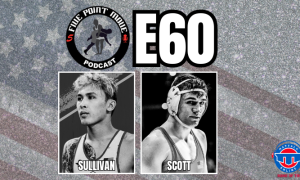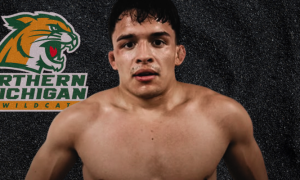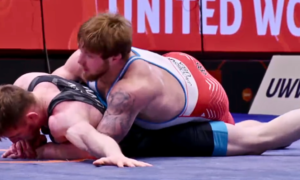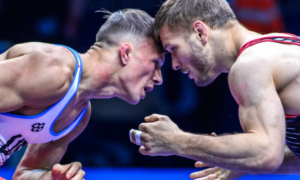In terms of how we do things in the United States, Alex Mossing (71 kg) is what you’d call a “complete wrestler.” He has credible experience in all three styles and as a student at the US Air Force Academy, Mossing is set to begin what will be his junior year of collegiate competition not too long from now. There is some lineage involved with that. Mossing has a cousin and an uncle who also attended the Academy some years back, and his cousin Josh is currently part of the wrestling program along with him. Both men are scheduled to graduate in 2019.
While Mossing may wind up acquiring big-time success at the NCAA level, it is in Greco-Roman where an even more sparkling future may reside. The style seems to fit him like a broken-in glove. His approach is one reason. Mossing is the ultimate “come forward” type of athlete always looking to put up points. A lot of wrestlers may claim that is their goal, but few really seem to constantly hunt for scoring positions the way he does. The sample size is admittedly small — Mossing, originally of Ohio, picked up some experience as a Cadet before he found himself in the Falcons’ wrestling room. He then made an appearance at the 2016 University Nationals, placing third. Not too bad, considering the allotment of full-timers who took up space in his bracket.
This past April, Mossing went 3-2 at the Senior World Team Trials in Las Vegas. Also not bad. But what gets lost in the results is how he actually competed. His two losses on the day, to 2014 World Team Trials and 2016 Olympic Team Trials champ RaVaughn Perkins (NYAC), and eventual fourth in Vegas, Colin Schubert (NYAC-OTS), were tech falls. Ignore that. Even in those bouts, Mossing never appeared out of his element or outgunned. It was a sight to see. Here was a wrestler, giving up points to more experienced opposition, but only because he never stopped pressing the action whilst trying to ignite his own offense. Mossing, for better or worse, was in those matches and anyone with a working pair of eyeballs could see the potential simmering beneath the surface.
His next time out was the University Nationals in Akron. A tightly-contested victory early on against top contender Austin Morrow (66 kg, NYAC-OTS) was as close as anyone else would get on that day. Mossing tech’ed out his next two opponents, but it was what happened in the finals that really dropped some jaws. Facing off with Anthonie “Twinkie” Linares (NYAC-OTS), one of the country’s brightest prospects, the Air Force wrestler was a throwing machine. He introduced Linares’s back to the floor three times in the first period and once again in the second to finish it off. It was Mossing’s first Greco National title and also, the last time we’ve seen him compete.
That’ll change in just a few weeks. Mossing has confirmed that he will be entering the US U23 World Team Trials early next month in Chicago. One has to figure his is a name other wrestlers at 71 kilograms will be looking out for, and rightfully so. Mossing is strong, fast, aggressive, and exciting. Instead of feeling burdened by Greco’s differences, he takes an opposite viewpoint. To Mossing, Greco-Roman is liberation, a wrestling style that allows him to not worry about anything other than staying in the fight. And that is something we could perhaps use a lot more of in this sport nowadays.
Alex Mossing — 71 kg, Foxfire
5PM: First and foremost, are you definitely locked in to compete at the U23 World Team Trials?
Alex Mossing: Yes. We’ve already got it scheduled that I’ll be competing at the World Team Trials at 71 kilos. My coaches and I will be going out there and another guy on our team will be out there wrestling freestyle, as well.
5PM: Should you win the World Team spot, will it produce a potential scheduling conflict for you with your collegiate season?
AM: My coaches and I already talked about it. We would just kind of postpone my freestyle season and he would want me training that whole month in between all Greco. And I’d probably go up to the OTC (Olympic Training Center) and train up there. There won’t be any conflicts, we’ve already resolved it.
5PM: You’re certainly an offensively-minded Greco wrestler. How are you able to step out of folkstyle and compete in Greco so effectively?
AM: For me, it’s not really a big style change too much because they are two different styles. It’s easier for me to transition from folkstyle into Greco than it is to go from Greco into folkstyle. Going from folkstyle to Greco, I pretty much have a seamless transition because I just need to stand up a little straighter and hit the bodylocks. That transition, it’s not really too hard for me because I just get in there and the hand-fighting is pretty similar. The throws come pretty natural to me. I got lucky growing up because I had a good Greco coach at our local club and he taught me the right way to throw, so I’ve always had that sense of throwing down. That also makes the transition way easier.
5PM: Would it be safe to say that part of your secret, and I’m just going by the your response, is that you keep it simple? You’re not overcomplicating it.
AM: Yes. Yeah, for me, when it comes to Greco, I still have a ton of stuff to learn, so whenever I wrestle I just kind of stick to the basics of what I know so there isn’t a ton of stuff I have to brush up on when I transition to it.
5PM: What attracts you to Greco?
Alex Mossing: What attracts me to Greco is that you can go out there and try a bunch of offensive moves. You keep going. You’re in a bodylock and you try to throw him, you give up two, kind of go out of bounds right on the edge or something, and then you get right back up and you get another opportunity to throw. You can make up points really fast. If you’re down 7-0 or something, you’re not out of the match. Whereas in folkstyle, if you try a move and you get caught on your back, and you’re down 6-0 in a period, it’s really hard to work your way back throughout the whole match because there aren’t as many opportunities to score points in folkstyle, I would say, as there are in Greco.
5PM: Especially at the collegiate level, where it’s very much a control sport, right?
AM: Right. It’s just nice that you can go out there and let it all loose and try to score as much as possible. I think that’s more fun for me, just both guys going out there trying to hit big throws and having the crowd cheer about something.
5PM: When you watch international events, whether it’s the Worlds or the Hungarian Grand Prix, or whatever tournament, what do you see as the differences between foreign and domestic competitors?
AM: It seems like, when I watch people from overseas wrestle, that they are a bit more open and they aren’t as afraid to give up positions because that’s how they get into their position to throw, as well. It seems like with Americans, we’re more closed off, trying not to give up any position at all. For me, it looks like it would be harder to get the positions, but also, you’re less likely to get caught in a throw because they (Americans) aren’t as open. That’s just what I’ve seen by watching because obviously, I haven’t competed internationally yet.
Watching Kamal Bey at the Junior World Championships, it seemed like all of his matches were big, high-throwing, both guys attacking the whole time, and then watching him compete at the World Team Trials, it didn’t seem as open the whole time.
5PM: Which is why I asked you that. International Greco seems like it agrees with your style, that you’d match up well internationally because of your approach. Do you see that also?
AM: Yeah, I think so. I think I have a very open style compared to most Americans. I think that’s good going to the international level.
5PM: What was your main takeaway from the Senior World Team Trials? You lost a couple matches, but you wrestled very tough, stayed aggressive, and you never wilted. Dropping points at a tournament like that to guys like RaVaughn Perkins and Colin Schubert, it’s an experience. So what was your main focus going in, what was your takeaway coming out, and how did you use what you learned going into Akron?
Alex Mossing: Going in, I didn’t really have a lot of expectations. I wrestled with those guys before, RaVaughn and Pat Smith, and other guys, up at the OTC. So I knew I could wrestle with them. In positions, I could wrestle with them. I was confident going into the Trials that though I might not win it, I can wrestle with these guys and that I deserved to be there. That was my mindset going in. I learned quickly that the matches come up fast and often there. That was kind of a shock for me.
Between that, and not knowing Greco well enough and staying in position. I would just kind of get into a bodylock or a throwing position and leave myself wide open to other attacks. My takeaways were that I need to focus on my position and take more time getting into them. Don’t rush ’em. And then, just to be ready to wrestle a lot of matches in a row.
As I was training for the Universities in Akron, I focused on keeping my positions, getting to my locks, staying solid, and I had better conditioning, so I could wrestle hard the whole match and stay aggressive.
5PM: The new weight classes. I’m sure you’re familiar and it doesn’t look like your life would change a whole lot. Give me your general scope. What was your reaction when you saw the new weights announced by UWW?
AM: It kind of puts me in a more interesting position because I think my ideal weight would be around 69 kilos. When they raised the Olympic weight from 66 to 67, I think it gives me an option to go down. This year, what we’re thinking is to wrestle 71 at U23’s and depending on how that goes, get down to 149 (lbs) for the collegiate season and see how I feel there. From there, decide if I can go down to 67 in the future or stay at 72. That’s kind of my thoughts about it, deciding which weights to go.
5PM: I imagine the weigh-in format plays a role in your decision.
AM: Yes. If it was still a day-before weigh-in, I think for sure I’d be going down to 67, but since they started the same-day weigh-in, it adds that extra difficulty to making weight and feeling good down at the weight.
5PM: Par terre is due to arrive back into the curriculum. You’re definitely someone who wrestles very well on their feet, and this is something that is going to affect everybody, particularly some of the younger guys. What is your feeling about this? Is this an aspect to Greco you’re looking forward to really honing back in on?
AM: I’ve always enjoyed wrestling on top in par terre. I used to love when they had forced par terre back when I was wrestling Cadet and that is what I used to think in pretty much every match — getting on top in forced par terre and then getting turns. When they took that away, I transitioned more to throws. So going back to forced par terre I don’t think affects me too much one way or the other. I think the only thing is, I have to start working on bottom par terre more because that just seems to be where everybody struggles, and I struggle down there a lot. I think it just adds a new aspect. It is another thing to train on and focus on. I think it should be pretty interesting.
5PM: Do you think Greco needs forced par terre to encourage more scoring?
AM: I would say forced par terre kind of discourages scoring because people will focus on not getting taken down on their feet and just waiting for forced par terre so they can get on top. It hones all of their abilities on the par terre position. I am of the opinion that it disincentivizes scoring on the feet and allows you another way to score without forcing the action on your feet.
5PM: You touched on it before, but what does the training phase look like for you right now as you gear up for the U23 World Team Trials? Are you in the middle of a hard phase? When you taper, how are you doing it, considering your collegiate responsibilities? How are you managing all of this with a major tournament coming up?
Alex Mossing: Right now, I am still wrestling hard and I think getting in there and competing and brawling with guys is really important to training. I don’t have a lot of Greco partners up here, so when I wrestle folkstyle against the other guys in our room, we just compete real hard the whole time so I can get that competitiveness and that live feel. I try to sprinkled Greco in as much as I can outside of team functions. My coach is really good about letting me train Greco whenever I want. Probably about two weeks out, I’ll start going back to only Greco and then start tapering down a little bit to get ready for the Trials.
Follow Alex Mossing on Twitter and Instagram to keep up with his career and competitive schedule.
SUBSCRIBE TO THE FIVE POINT MOVE PODCAST
iTunes | Stitcher | Spreaker | Google Play Music | RSS


















